A Commitment to Ethics
and Trustworthy Sustainability Reporting and Assurance
The IESBA’s Global Ethics Sustainability Standards encompass the International Ethics Standards for Sustainability Assurance (including International Independence Standards) (IESSA), revisions to existing sustainability reporting standards, and a new standard on using the work of external experts.These standards are built on fundamental ethical principles for reporting and assurance.
IESBA's global ethics sustainability standards...
are built on fundamental ethical principles for reporting and assurance, providing a robust foundation for delivering high-quality sustainability information by:
- Offering a coherent ethical infrastructure for sustainability reporting and assurance that is fit-for-purpose. The standards specifically address challenges inherent to sustainability information, such as the use of immature data and systems, and the forward-looking nature of the information.
- Mitigating unethical conduct, including greenwashing risks, particularly by raising awareness of ethical threats and helping practitioners address challenges such as: non-compliance with laws and regulations (NOCLAR); pressure to act unethically; independence issues; and ethical risks relating to using the work of external experts.
- Enhancing investor protection and building trust in sustainability information by aligning best ethical practices among all practitioners.
- Promoting judgments and decision-making that help prevent reputational risks, foster an ethical mindset, and attract skilled and purpose-driven professionals
-
IESBA Staff Releases Additional Implementation Support Materials for IESSA and Using the Work of an External Expert
September 8, 2025
The International Ethics Standards Board for Accountants (IESBA) today released two new staff publications to enhance understanding and support global adoption and implementation of its ethics standard on Using the Work of an External Expert as well as the International Ethics Standards for Sustainability AssuranceTM (including International Independence StandardsTM) (IESSATM), both of which are effective from December 2026. These publications explain key aspects of the standard related to using the work of an external expert and the proportionality of the ethics and independence provisions for sustainability assurance in the IESSA.
1. Questions and Answers on Using the Work of an External Expert
This publication is relevant to all professional accountants, whether in business or in public practice, and sustainability assurance practitioners (SAPs). It provides answers to common questions on:
- Evaluating whether to use the work of an external expert
- How to identify an external expert
- The extended requirements for evaluating the objectivity of an external expert in the context of an audit or other assurance (including sustainability) engagement
- Concluding an external expert’s competence, capabilities and objectivity
- Potential threats arising from using the work of an external expert
- Specific considerations related to the IESSA
Access other resources relating to this standard on the IESBA Experts Page.
2. Proportionality of the IESSA
This publication highlights key aspects of the IESSA that illustrate its proportionality, while the IESSA also provides a robust global ethics and independence baseline for sustainability assurance engagements (SAEs). The proportionality of the IESSA enables it to support the performance of SAEs for entities of all sizes, thereby underpinning public trust in those engagements.
The publication is especially geared towards facilitating the implementation of the IESSA by SAPs that are small and medium practices (SMPs).
Access other resources relating to the IESSA on the IESBA Sustainability Focus Page.
Both publications may also be helpful to jurisdictional standard setters, regulators and oversight bodies, professional accountancy organizations, educational bodies, and other stakeholders.
July 30, 2025
The Staff of the International Ethics Standards Board for Accountants (IESBA) has released two implementation support publications to help sustainability assurance practitioners understand and apply the International Ethics Standards for Sustainability Assurance (including International Independence Standards) (IESSA):
- Key Differences: A comparison document outlining the main differences between the IESSA and the corresponding provisions of the IESBA Code applicable to audits of financial statement.
- List of PIE Prohibitions: A list of specific prohibitions in the IESSA applicable to sustainability assurance engagements of public interest entities (PIEs).
Image
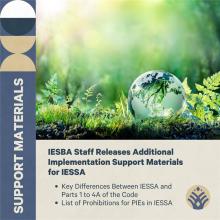
The Key Differences Between IESSA and Parts 1 to 4A of the Code provides an overview of how the IESSA compares to the ethics and independence provisions in the IESBA Code that apply to audits of financial statements. It is intended to support firms that already follow the Code in understanding and implementing the IESSA for sustainability assurance engagements. For reference purposes, the publication is accompanied by a marked-up version of the IESSA showing changes from the corresponding sections of the extant Code.
The List of Prohibitions for PIEs in IESSA summarizes the specific interests, relationships, non-assurance services and other circumstances prohibited under the IESSA when performing sustainability assurance engagements for PIEs. It is intended as a high-level reference to help sustainability assurance practitioners in further understanding the prohibitions in the IESSA.
Jurisdictional standard setters, regulators and oversight bodies, professional accountancy organizations, educational institutions and other stakeholders may also find the publications useful.
These new resources are part of a comprehensive implementation support program the IESBA has put in place—a strategic priority aimed at promoting the adoption and consistent and effective implementation of the IESSA, which becomes effective in December 2026. Led by a dedicated Adoption and Implementation Working Group, this effort includes a growing suite of guidance materials, webinars, and other resources to back the rollout of the Global Ethics Sustainability Standards.
Read the publications on IESBA’s Support and Resources Page
-
IESBA Establishes Expert Groups to Support Global Implementation of Sustainability Standards
The IESBA's IESSA Implementation Monitoring Advisory Group (IIMAG) is a globally diverse team of experts supporting the effective rollout of the International Ethics Standards for Sustainability Assurance (IESSA) and related updates to the IESBA Code.
The IIMAG will provide real-world insights and help shape practical implementation resources to promote consistent, high-quality application around the world.
IIMAG Membership
Chair: Luigi Nisoli, IESBA Member
Members:
- Antonio Astone – Global Sustainability Manager, DNV GL Business Assurance
- Karen Bjune - Managing Director, Global Independence at KPMG International
- Fernando Elias Costa - Chair of Ethics, Compliance and Independence Committee at IBRACON / Partner at Deloitte Brazil
- Liezel du Preez – Professional Manager Standards, IRBA
- Liz Giust - Managing Director at Qualitas Consultants Pty Ltd
- Andrew Kerr – Managing Director at PwC
- Cheng King Yip, Kingsley – Partner, PAL Advisory Limited
- Marisa Orbea - Partner, Independence & Conflicts Leader, Deloitte Australia
- Chiho Muto - Vice Chair of Ethics Committee of JICPA / Partner at Ernst & Young ShinNihon LLC (Japan)
- Raphael Savalle – Group CFO, Weleda AG
- Isabelle Tracq Sengeissen - Partner at EY
IIMAG Staff: Szilvia Sramko, IESBA Principal
IAASB Observer: Claire Graystone, IAASB Principal
-
Submit Questions & Feedback on IESSA Implementation
Submission FormImage
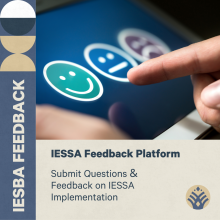
To support effective implementation of the IESSA, the IESBA invites stakeholders to submit implementation questions or matters for the IESBA’s consideration.
Submission Criteria
Submissions should meet the following criteria:
- Be directly related to the implementation of the IESSA.
- Contain a detailed description of the question or matter, including sufficient context to enable a proper understanding of the submission.
- Be relevant to a broad group of stakeholders or common across multiple jurisdictions, as the IESSA serves as a global baseline. The IESBA does not focus on national implementation or adoption issues, or on assurance methodology.
Submission Process
Once you have completed the submission form, your submission will remain private. However, the question or matter raised may be discussed publicly or referenced in the IESBA’s public materials without specific attribution. While submission forms will remain private and confidential, please refrain from including any confidential information.
IESBA Consideration of Submissions
The IESBA will review submissions and may also collaborate with the IAASB in doing so. The IESBA reserves the right to identify and explore relevant implementation issues and determine whether to address them and the most appropriate means of doing so. The IESBA will not respond to, or report back on, individual submissions. However, submissions will inform the IESBA’s priorities for guidance as well as the nature and urgency of any appropriate response.
If you have any questions or matters to raise regarding the implementation of ISSA 5000, please visit the IAASB’s website: Submit Questions & Feedback on ISSA 5000 Implementation
If you have any questions or matters to raise regarding the implementation of the IESSA, please click below.
IESBA Explainers: Sustainability Reporting and Assurance

Introduction to the Global Ethics Sustainability Standards
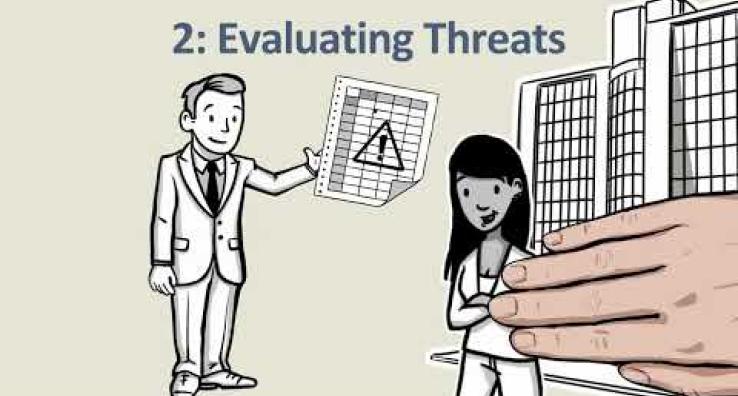
Ethics in Sustainability Reporting

IESSA and Ethics in Sustainability Assurance
Learn more about the Global Ethics Sustainability Standards below, including the final pronouncement, related documents, fact sheets, and other resources.

IESSA and Related Revisions: A global baseline for the ethical conduct and independence of practitioners performing sustainability assurance engagements
The International Ethics Standards for Sustainability Assurance (including International Independence Standards) and related revisions to the Code, address critical risks to the integrity, quality and effectiveness of sustainability reporting and assurance such as bias, conflicts of interest, pressure to act unethically, fraud including greenwashing, non-compliance with laws and regulations, and threats to the independence of the assurance practitioners.
Using the Work of an External Expert
A principles-based framework to guide:
- The ethical considerations relating to the competence, capabilities and objectivity of external experts whose work is used by professional accountants (PAs) in business (PAIBs), PAs in public practice (PAPPs) and sustainability assurance practitioners (SAPs) in carrying out their professional activities or services; and
- The ethical behavior of PAIBs, PAPPs and SAPs when using the work of such external experts.
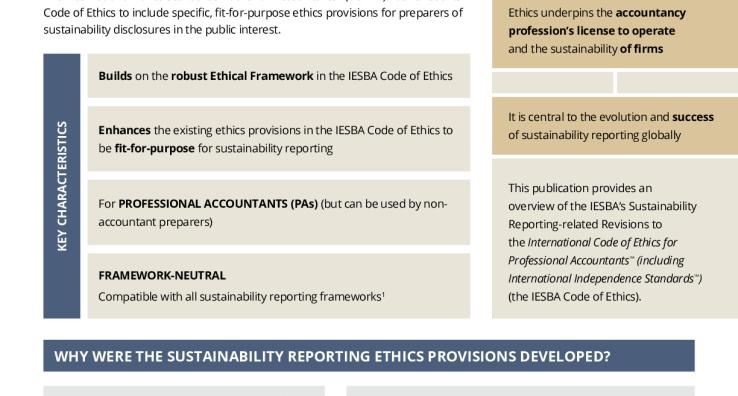
Ethics for Sustainability Reporting - Fact Sheet
This fact sheet explains key points of the revisions to the International Code of Ethics for Professional Accountants (including International Independence Standards) (the Code) related to sustainability reporting.
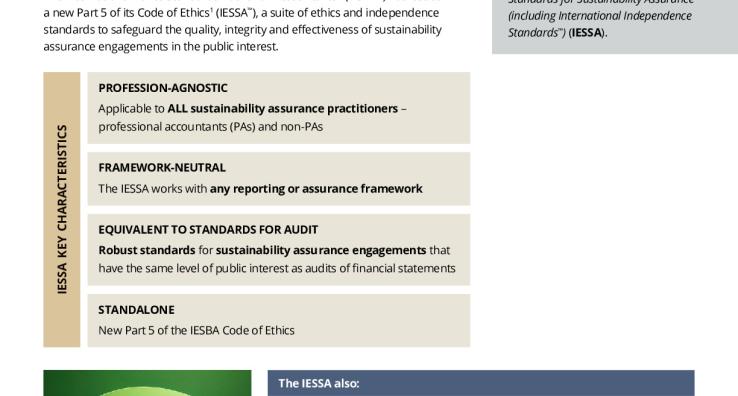
Ethics & Independence for Sustainability Asssurance - IESSA - Fact Sheet
Explains key points of the IESSA and related revisions to the Code that address critical risks to the integrity, quality and effectiveness of sustainability reporting and assurance such as bias, conflicts of interest, pressure to act unethically, fraud including greenwashing, non-compliance with laws and regulations, and threats to the independence of the assurance practitioners.
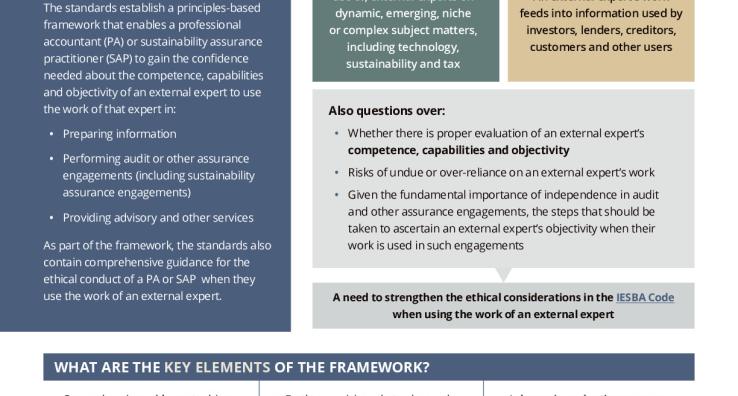
Using the Work of an External Expert Fact Sheet
This fact sheet explains key points of the Using the Work of an External Expert Final Pronouncement, which provides an ethical framework to guide professional accountants or sustainability assurance practitioners, as applicable, in evaluating whether an external expert has the necessary competence, capabilities and objectivity in order to use that expert’s work for the intended purposes.
-
Global Ethics Sustainability Standards Webinars
Image
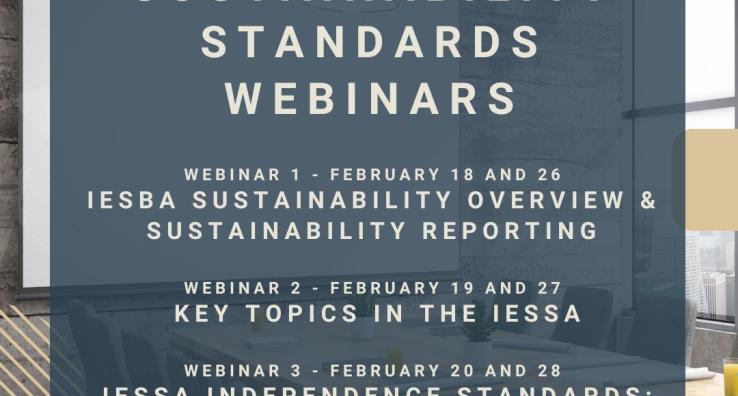
Watch the recent webinars hosted by the IESBA Team, which break down the IESSA (International Ethics Standards for Sustainability Assurance), the Use of Experts, and other key revisions to the Code.
-
IESBA Sustainability Reference Group
IESBA's Sustainability Reference Group (SRG) has been established to support the work of its Sustainability Task Force. The SRG members have been selected based on a series of criteria, including their background, experience or expertise in sustainability reporting or assurance, stakeholder groups, and geographical location. The members will act as a “sounding board” to the Sustainability Task Force, providing insights, expertise, or advice relating to the development of global ethics and independence standards for sustainability reporting and assurance.
The SRG will be chaired by Mr. Channa Wijesinghe, IESBA Member and Sustainability Task Force Member.
The SRG Members are:
- Kenneth Amaeshi, European University Institute, Africa
- Antonio Astone, DNV, Europe
- Michael Bray, Deakin University, Oceania
- Charlotte Drain, Deloitte LLP, Europe
- Dongsoo Kim, AccountAbility, Asia
- Kristian Koktvedgaard, Confederation of Danish Industry and EFRAG Sustainability Reporting Board Member, Europe
- Olga Rivas, Independent International Organisation for Certification, Global
- Samantha Ross, AssuranceMark, North America
- Michael Tang, SGX Group, Asia
Objectives of Sustainability Reference Group (SRG)
- To act as a sounding board to the IESBA’s Sustainability Task Force on proposals relating to the development of global ethics and independence standards for sustainability reporting and assurance (“IESBA sustainability standards”).
- To provide insights, expertise or advice on identified areas or matters relating to the development of the IESBA sustainability standards.
- To provide input to, or otherwise assist in, the development of non-authoritative guidance material relating to the application of the IESBA sustainability standards.
-
Additional IESBA Materials
Image
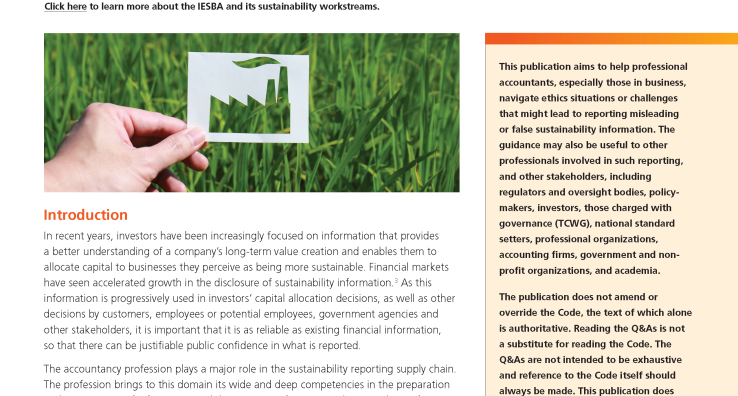
Ethics Considerations in Sustainability Reporting: Including Guidance to Address Concerns About Greenwashing
The IESBA is committed to being part of the rapidly progressing developments regarding sustainability reporting and assurance and providing timely responses to ethics and independence-related concerns.
This publication is intended to highlight the relevance and applicability of the Code to several ethics-related challenges arising from professional accountants' involvement in sustainability reporting and assurance, especially circumstances related to misleading or false sustainability information (i.e., "greenwashing").
